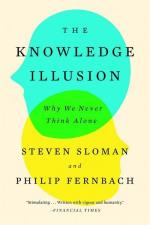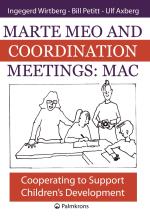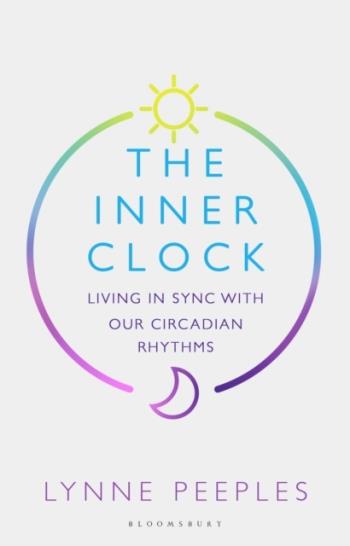Engelska
Mest sålda

-
Title:
The Knowledge Illusion
-
Reviews:
-
Release Date:
-
Genre:
- Psykologi
-
Format:
Bok
-
Availability:
Beställningsvara Leveranstid: från 14 vardagar
-
Description:
Humans have built hugely complex societies and technologies, but most of us don't even know how a pen or a toilet works. How have we achieved so much despite understanding so little? Cognitive scientists Steven Sloman and Philip Fernbach argue that we survive and thrive despite our mental shortcomi...
The Knowledge Illusion Bok
Humans have built hugely complex societies and technologies, but most of us don't even know how a pen or a toilet works. How have we achieved so much despite understanding so little? Cognitive scientists Steven Sloman and Philip Fernbach argue that we survive and thrive despite our mental shortcomings because we live in a rich community of knowledge. The key to our intelligence lies in the people and things around us. We're constantly drawing on information and expertise stored outside our heads: in our bodies, our environment, our possessions, and the community with which we interact-and usually we don't even realize we're doing it.<br/><br/>The human mind is both brilliant and pathetic. We have mastered fire, created democratic institutions, stood on the moon, and sequenced our genome. And yet each of us is error prone, sometimes irrational, and often ignorant. The fundamentally communal nature of intelligence and knowledge explains why we often assume we know more than we really do, why political opinions and false beliefs are so hard to change, and why individual-oriented approaches to education and management frequently fail. But our collaborative minds also enable us to do amazing things. <i>The Knowledge Illusion</i> contends that true genius can be found in the ways we create intelligence using the community around us.

-
Title:
Digital Tools In Education. On Usage, Effects, And The Role Of The Teacher
-
Reviews:
-
Release Date:
-
Genre:
- Pedagogik
-
Format:
Bok
-
Availability:
Beställningsvara Leveranstid: från 3 vardagar
-
Description:
This report shows that information and communications technology (ICT) in education can be effective under certain circumstances, and that the teacher plays a significant role in this. ICT in education generally refers to anything that involves technology in education. This includes devices such as...
Digital Tools In Education. On Usage, Effects, And The Role Of The Teacher Bok
This report shows that information and communications technology (ICT) in education can be effective under certain circumstances, and that the teacher plays a significant role in this. ICT in education generally refers to anything that involves technology in education. This includes devices such as computers, tablets, smartphones and interactive whiteboards, but also software such as educational games and digital learning tools and all educational applications that can be found on the Internet. The report aims to contribute to the debate on which types of ICT use in education that have proven to be effective. This will be discussed from the perspective of earlier research, as well as several studies with experiments run at secondary schools in the Netherlands. The aim is to bring research and practice closer together, by discussing the applicability of the findings from earlier studies and the Dutch experiments. Carla Haelermans is an Assistant Professor in Education Economics at Top Institute for Evidence Based Education Research, Maastricht University.

-
Title:
Marte Meo And Coordination Meetings - Mac
-
Reviews:
-
Release Date:
-
Genre:
- Psykologi
-
Format:
Bok
-
Availability:
Beställningsvara Leveranstid: från 3 vardagar
-
Description:
In the early 1990s two sets of experiences coincided and eventually resulted in the development of Marte Meo and Co-ordination Meetings (MAC). The first concerned my experience of inter-agency effectiveness in Sweden. In my work as an external supervisor and trainer in my hometown I often came acro...
Marte Meo And Coordination Meetings - Mac Bok
In the early 1990s two sets of experiences coincided and eventually resulted in the development of Marte Meo and Co-ordination Meetings (MAC). The first concerned my experience of inter-agency effectiveness in Sweden. In my work as an external supervisor and trainer in my hometown I often came across the same children, but in different professional contexts. They and their families had been referred to different agencies and the reason for the referral was often a teacher who expressed her concern about the child s development. The school often described these children as having interaction and learning problems. It was also common that the agencies to whom the children were referred the Social Services, Child Guidance Clinics, agencies for children with special needs etc. did not share the school s definition of the problem. This was sometimes true even for the child s parents. However, the general consensus from the professionals was that the family should receive some form of help, and that this work would then (hopefully) result in the child performing better in school. It could also be that the different agencies disagreed in their evaluation of the seriousness of the child s problem or whose responsibility it was to help. More than once I witnessed schools and other agencies criticise each other, each of them often questioning the way in which the other defined and carried out their professional responsibilities. This kind of experience strengthened the conviction that there must surely be a fairly simple and practical way for the agencies created by society in order to protect and ensure children s safety and development to co-operate more effectively, and use their resources and knowledge in a more co-ordinated fashion. Another clearly observed pattern was that when the parents of the child did not share the professional s view of the child s need for support, the resulting conflict often stopped the child from receiving any kind of support. A short history 0-titel-innehall-x.indd 7 2013-02-11 19.01 8 The second was coming into contact with and learning the videobased model named Marte Meo. I helped introduce Marte Meo into Sweden in the late eighties and although at that time nothing was known (more than anecdotal evidence) regarding the effectiveness of the model, it quickly became apparent that there was a great deal of interest to implement it in different professional settings. A colleague and friend Professor Kjell Hansson constantly reminded me about the lack of evidence, and in particular what he said was my lack of responsibility in introducing a model whose effectiveness was unknown. His friendly pressure was very helpful, and the decision was made to research the model and its effectiveness. These two sets of experiences were the starting point of what later became MAC. One of the core ideas that form the foundation of MAC is that the child can be offered help in that context where her problem is first observed and identified in this case, the school. In practice, this means that when the school seeks contact with parents, it is to ask for their consent so that the teacher can get extra help in the classroom to better support their child. Succeeding experience has shown that few parent turns down this offer. In the early stages of planning a pilot-project it became apparent that some kind of social construction a story or narrative that could be accepted by all parts was needed to keep the system of school and parents co-ordinated, and create a co-operative frame. Such a frame would help elicit the parents blessing in the school s attempt to support their children, and offer the school a rationale that would justify the extra expenditure of time and energy in the classroom. The idea of how this should happen in practice was initially rather foggy, and it proved to be a stroke of luck to invite psychologist Ulf Axberg, Ph. D. to help with the creation of this part of the project. He brought both theoretical and practical clarity with him, and researched the work, and eventually wrote his doctoral dissertation on the project. Kjell Hansson has continued to offer his invaluable collaboration during MAC s development over time, as well as to the ongoing research designed to determine its effectiveness. He has been a constant discussion partner and has given constructive feedback throughout the writing process. Ingegerd Wirtberg

-
Title:
Blueprint
-
Reviews:
-
Release Date:
-
Genre:
- Psykologi
-
Format:
Bok
-
Availability:
Beställningsvara Leveranstid: från 14 vardagar
-
Description:
The blueprint for our individuality lies in the 1% of DNA that differs between people. Our intellectual capacity, our introversion or extraversion, our vulnerability to mental illness, even whether we are a morning person - all of these aspects of our personality are profoundly shaped by our inheri...
Blueprint Bok
<p>The blueprint for our individuality lies in the 1% of DNA that differs between people. Our intellectual capacity, our introversion or extraversion, our vulnerability to mental illness, even whether we are a morning person - all of these aspects of our personality are profoundly shaped by our inherited DNA differences. In Blueprint, Robert Plomin, a pioneer in the field of behavioural genetics, draws on a lifetime's worth of research to make the case that DNA is the most important factor shaping who we are. Our families, schools and the environment around us are important, but they are not as influential as our genes. This is why, he argues, teachers and parents should accept children for who they are, rather than trying to mould them in certain directions. Even the environments we choose and the signal events that impact our lives, from divorce to addiction, are influenced by our genetic predispositions. Now, thanks to the DNA revolution, it is becoming possible to predict who we will become, at birth, from our DNA alone. As Plomin shows us, these developments have sweeping implications for how we think about parenting, education, and social mobility. A game-changing book by a leader in the field, Blueprint shows how the DNA present in the single cell with which we all begin our lives can impact our behaviour as adults.</p>

-
Title:
Suzuki Organ School Vol 6, Bok/cd
-
Reviews:
-
Release Date:
-
Genre:
- Pedagogik
-
Format:
Bok
-
Availability:
Beställningsvara Leveranstid: från 7 vardagar
-
Description:
Suzuki Organ School Vol 6, Bok/cd [Bok / Häftad]
Suzuki Organ School Vol 6, Bok/cd Bok
Suzuki Organ School Vol 6, Bok/cd [Bok / Häftad]

-
Title:
Suzuki Organ School 3 With Cd
-
Reviews:
-
Release Date:
-
Genre:
- Pedagogik
-
Format:
Bok
-
Availability:
Beställningsvara Leveranstid: från 7 vardagar
-
Description:
Suzuki Organ School 3 With Cd [Bok / Häftad]
Suzuki Organ School 3 With Cd Bok
Suzuki Organ School 3 With Cd [Bok / Häftad]

-
Title:
Suzuki Organ School Vol 5, Bok/cd
-
Reviews:
-
Release Date:
-
Genre:
- Pedagogik
-
Format:
Bok
-
Availability:
Beställningsvara Leveranstid: från 7 vardagar
-
Description:
Suzuki Organ School Vol 5, Bok/cd [Bok / Häftad]
Suzuki Organ School Vol 5, Bok/cd Bok
Suzuki Organ School Vol 5, Bok/cd [Bok / Häftad]
Utvalt - Engelska
The Inner Clock
At this very moment, a symphony of tiny timepieces is ticking throughout your body - in your stomach and skin, in your liver and lungs, even in your legs. Orchestrating this round-the-clock productio...
- Populärt
- Mest sålda
- Mest bokade
- Senast släppta
- Kommande
- Pris
- A-Ö
- Välj
- 0 - 9
- A
- B
- C
- D
- E
- F
- G
- H
- I
- J
- K
- L
- M
- N
- O
- P
- Q
- R
- S
- T
- U
- V
- W
- X
- Y
- Z
- Å
- Ä
- Ö
- Övrigt

